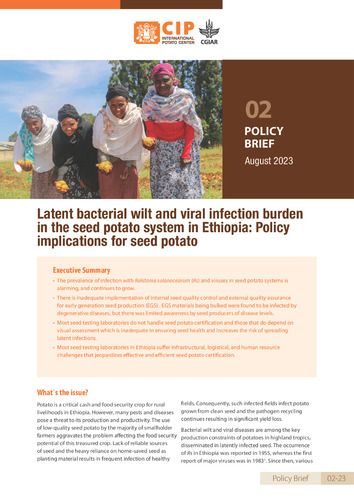Executive Summary
• The prevalence of infection with Ralstonia solanacearum (Rs) and viruses in seed potato systems is
alarming, and continues to grow.
• There is inadequate implementation of internal seed quality control and external quality assurance
for early generation seed production (EGS). EGS materials being bulked were found to be infected by
degenerative diseases, but there was limited awareness by seed producers of disease levels.
• Most seed testing laboratories do not handle seed potato certification and those that do depend on
visual assessment which is inadequate in ensuring seed health and increases the risk of spreading
latent infections.
• Most seed testing laboratories in Ethiopia suffer infrastructural, logistical, and human resource
challenges that jeopardizes effective and efficient seed potato certification.
Latent bacterial wilt and viral infection burden in the seed potato system in Ethiopia: Policy implications for seed potato
Citation: Tessema, L.; Kakuhenzire, R.; McEwan, M. 2023. Latent bacterial wilt and viral infection burden in the seed potato system in Ethiopia: Policy implications for seed potato. Policy Brief 02. International Potato Center.
2023-10-09
POTATO AGRI-FOOD SYSTEMS, POTATOES, SEED SYSTEMS
AFRICA
ETHIOPIA
brief

